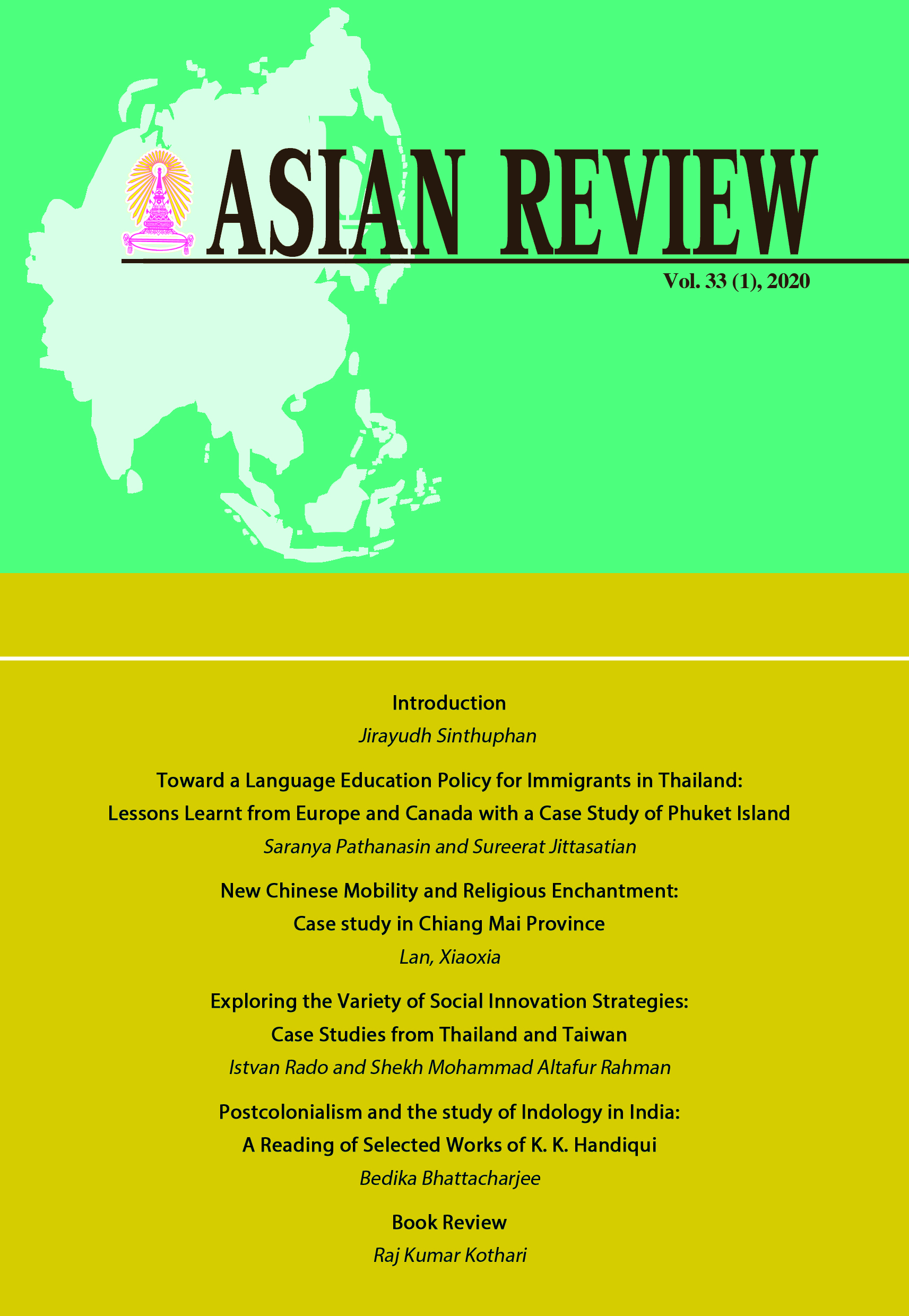Toward a Language Education Policy for Immigrants in Thailand: Lessons Learnt from Europe and Canada with a Case Study of Phuket Island
Keywords:
Language Policy, Mother Tongue Education, European Model, ThailandAbstract
Phuket, the most famous tourist island in Thailand, receives a large number of immigrants, especially from Myanmar, into its workforce. As a result, related immigration concerns are often linked to education. As such, a high number of children of these immigrants are not directly accepted by and assisted with suitable arrangements into local schools despite a linguistic priority which has been accepted internationally as a human right that children should learn in their mother tongue for improved educational success. In this study, the issue is approached by presenting a brief review of mother tongue instruction in Europe
and Canada with the aim to posit for Thai policy makers to consider initializing a suitable educational language policy specifically for the children of immigrants in Thailand by employing Phuket Island as a case study. The advantages and drawbacks from western countries could provide lessons for Thailand in coping with the issue. It is proposed that enabling languages in education for immigrant children should be set out with a clear vision and strategy, and that also some
educational authority should be decentralized to local governments who can respond effectively to the needs of stakeholders in the areas. Moreover, budgetary and management plans are crucial for successful implementation. Lastly, appropriate international collaboration will drive the policy toward success. Hence, linguistic phenomena within immigration and minorities in Thailand, as well as in other ASEAN countries, could be approached by moving away from the historically European standard language center, as noted by Halliday (2007).
References
Axelsson, Monica. 2005. “Mother tongue teaching and programs for bilingual children in Sweden, The Effectiveness of Bilingual School Programs for Immigrant
Children.” The Effectiveness of Bilingual School Programs for Immigrant Children.
Berlin: Wissenschaftszentrum Berlin für Sozialforschung (WZB).
Baker, Will. and Wisut Jarunthawatchai. 2017. “English language policy in Thailand.” European Journal of Language Policy 91: 27-43.
Bingol, Aslihan Selcen. 2012. “Mother tongue instruction policies towards Turkish Migrant Children in Europe.” Paper presented at the Akdeniz Language Studies
Conference 2012, Antalya, May 9-12.
Driessen, Geert. 2005. “From cure to curse: The rise and fall of bilingual education programs in the Netherlands, The Effectiveness of Bilingual School Programs for Immigrant Children.” The Effectiveness of Bilingual School Programs for Immigrant Children. Berlin: Wissenschaftszentrum Berlin für Sozialforschung (WZB).
Driessen, Geert. 2008. Towards citizenship education in the Netherlands. The Netherlands: Institute of Applied social sciences Radboud University Nijmegen.
Fry, Gerald. 2013. “Thailand’s New Language Policy Helps Enhance Cultural Democracy.” The Nation. November 18. http://www.nationmultimedia.com/opinion/
Thailands-new- language-policy-helpsenhance-cultur-30219853.html
Gogolin, Ingrid. 2005. “Bilingual education–The German experience and debate, The Effectiveness of Bilingual School Programs for Immigrant Children.” The Effectiveness of Bilingual School Programs for Immigrant Children. Berlin: Wissenschaftszentrum Berlin für Sozialforschung (WZB).
Halliday, Michael. 2007. “Applied Linguistics as an Evolving Theme.” Language and Education 9:1-19.
Hill, Margret. 1995. “Invandrarbarns möjligheter. Om kunskapsutveckling och språkutveckling i förskola och skola.” Göteborg: Göteborgs universitet, Institutionen för pedagogik.
Holmes, Janet. 2001. An Introduction to Sociolinguistics (Second edition). London: Longman.
Ghosh, Ratna. 2004. “Public Education and Multicultural Policy in Canada: The Special Case of Quebec.” International Review of education 50(5-6): 543-566.
Khieowan, Nuannut. 2017. “Factors Contributing to Adjustment of Migrants from Myanmar: A Case Study in Phuket.” PhD.diss., Universiti Sains Malaysia.
Kirkpatrick, Andy. 2012. “English in ASEAN: Implications for Regional Multilingualism.” Journal of Multilingual and Multicultural Development 33(4): 331-344.
Ministry of Labour Phuket Province. 2017. “Situation Labour of Phuket Report in 2017. https://issuu.com/phuket.mol/docs/c0512b3fc11939.
Nusche, Deborah., Gregory Wurzburg, and Breda Naughton. 2010. OECD Reviews of Migrant Education. Denmark: Organization for Economic Co-operation and
Development.
Roman, Victor, and Chuanprapun Sowirin. 2019. “Strengthening Access to Services for Migrant Children in Thailand.” Thailand Migration Report 2019. Bangkok:
United Nations Thematic Working Group on Migration in Thailand.
Spolsky, Bernard. 2004. Language Policy. Cambridge: Cambridge University Press. Thailand Ministry of Education. 2018. “Notification on the Acceptance of Students without Thai Identification Registration or Thai Citizenship.” Accessed September 22, 2019. https://www.moe.go.th/moe/upload/news19/FileUpload/50572-4089. pdf
Thai Royal Society. 2018. “Draft Plan for Thailand Policy.” Accessed September 20, 2019. http://www.royin.go.th/?p=21018.
Tourism Authority of Thailand. 2016. “Tropical Phuket attracts Thailand’s 31 millionth visitorof 2016.” Accessed June 20, 2018. https://www.tatnews.org/tropical-
phuket-attracts-thailands-31-millionth-visitor-2016/.
Winsa, Birger. 2005. Language Planning in Sweden. Language Planning and Policy in Europe, Vol.1 Hungary, Finland and Sweden. California: University of Southern California.
Downloads
Published
How to Cite
Issue
Section
License
Published articles are under the copyright of the Instiute of Asian Studies, Chulalongkorn University. Partially or totally publication of an article elsewhere is possible only after the consent from the editors.







